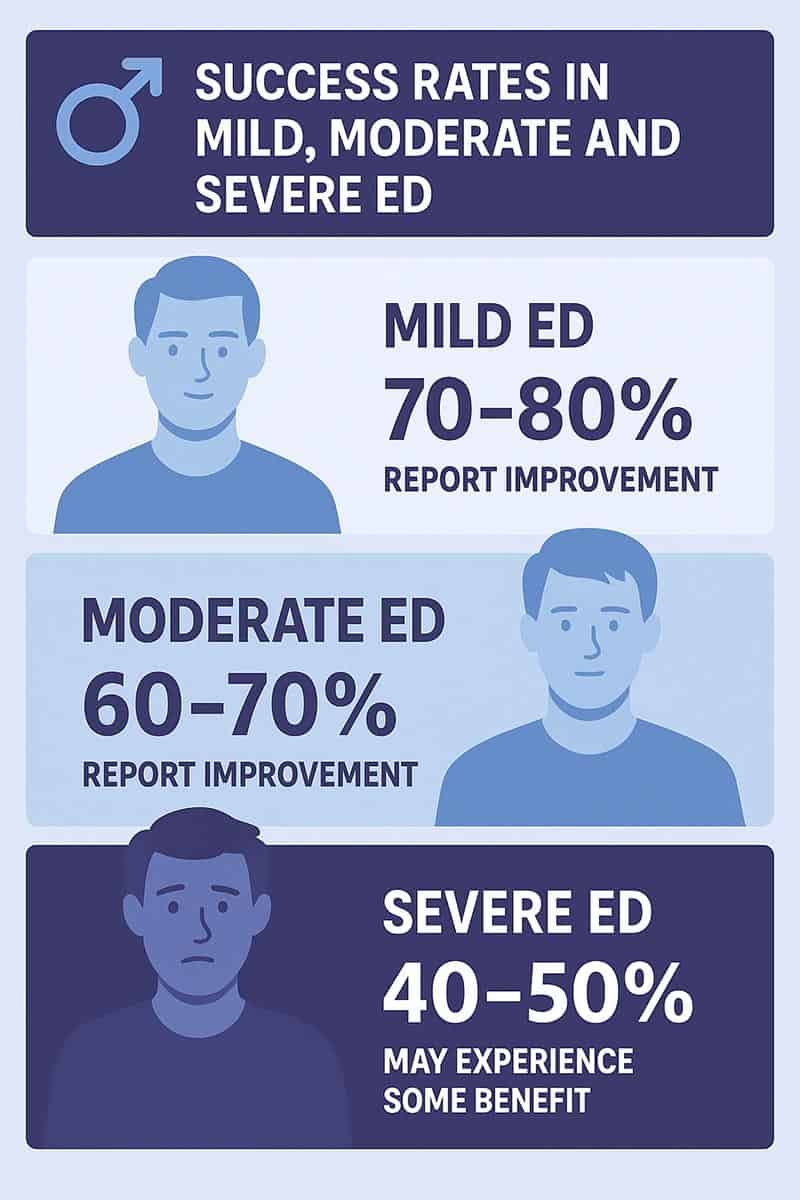Erectile dysfunction (ED) affects millions of men, often straining relationships and therefore reducing quality of life. While oral medications such as Viagra have long been the go-to solution, an increasing number of patients are exploring shockwave therapy for ED. This non-invasive treatment aims to restore natural erectile function by improving blood flow. Here you will find the current evidence on success rates, outcomes and what patients can realistically expect.
Clinical Effectiveness Backed by Studies
Results from UK and European Clinical Trials
Multiple clinical trials across the UK and Europe have studied the use of low-intensity extracorporeal shockwave therapy (Li-ESWT) for ED. Research shows that around 60–70% of men with vasculogenic ED (caused by poor blood flow) experience significant improvement.
Success Rates in Mild, Moderate and Severe ED

Longevity of Results and Follow-Up Outcomes
Follow-up studies at 6 and 12 months post-treatment show that many men maintain improved function without the need for medication. However, annual maintenance sessions may be recommended for sustained benefit.
Patient Outcomes and Real-World Evidence
Improvement in Erection Quality and Sexual Function
Many patients report stronger, more spontaneous erections after a course of shockwave therapy for ED. Improvements are usually gradual over a few weeks after treatment, with better rigidity and duration during intercourse.
Satisfaction Rates Reported by Patients
Patient satisfaction in private clinics is consistently high. A 2023 survey reported that over 77% of men were satisfied with their results, citing improved confidence, intimacy and sexual performance.
Different Outcomes Between Younger and Older Age Groups
Younger men (under 50) with fewer comorbidities tend to respond more favourably than older men. This is often due to better vascular health and fewer confounding conditions such as diabetes or heart disease.
Factors That Influence Treatment Success
Underlying Health Conditions (e.g. Diabetes, Heart Disease)
Conditions that impair blood flow or nerve function can reduce the effectiveness of shockwave therapy. Diabetic men, for example, may require more sessions or a combination of therapies.
Severity and Duration of ED Before Treatment
Chronic ED that has persisted for several years may be more resistant to shockwave therapy. Early intervention often leads to better outcomes.
Lifestyle Habits and Medication Use
Smoking, alcohol use, obesity and certain medications can all affect ED treatment success. Addressing these factors alongside therapy can significantly improve results.
Comparison with Other ED Treatments
Shockwave Therapy vs PDE5 Inhibitors (e.g. Viagra)
While PDE5 inhibitors offer faster, short-term relief, shockwave therapy targets the underlying cause: poor blood flow. Unlike medication, it can restore spontaneous function without the need for drugs.
Advantages Over Injections or Surgical Options
Shockwave therapy is painless, non-invasive and requires very little recovery time. It avoids the discomfort and side effects associated with injections or implants, making it appealing for men with varying ages and lifestyles.
Use in Combination with Other Therapies
Some men benefit from combining erectile dysfunction shockwave therapy with oral medication or lifestyle interventions. This approach is especially useful in moderate to severe cases.
Safety Profile and Side Effects
Shockwave therapy is generally very safe. Most patients experience no side effects. Mild redness or tingling may occur at the treatment area but usually resolves quickly. It is suitable for men who cannot take ED medications due to heart conditions or other contraindications.
NHS Availability and Private Treatment Options
Currently, shockwave therapy for ED is not widely available on the NHS. It is more commonly offered through private urology or men’s health clinics.
Costs vary depending on location and provider but typically range from £950 to £1500 for a full course (usually six sessions). Some clinics offer package deals or combination therapies.
Expert Opinions and Urologist Perspectives
UK urologists increasingly acknowledge the role of shockwave therapy in managing ED. According to Mr Shafi Wardak, Consultant Urological Surgeon & Andrologist at The Forbury Clinic, “Shockwave therapy offers a meaningful, non-invasive option for men looking to regain natural erectile function without lifelong medication.”
The British Society for Sexual Medicine recognises Li-ESWT as a promising treatment for vasculogenic ED, particularly in younger men and those unresponsive to medication.
Key Questions to Ask Before Starting Treatment
What results can I realistically expect given my age, health status and severity of ED?
This helps assess how well the treatment might work for you, based on whether your ED is vascular, longstanding or linked to other health issues.
How many sessions will I need, and over what timeframe?
Shockwave therapy typically involves a series of treatments over several weeks. Clarifying the number and schedule ensures you understand the full commitment needed to support meaningful improvement.
Will I need maintenance sessions to sustain improvement?
Some men benefit from occasional top-up sessions to maintain results. Knowing this in advance helps you prepare for how ED might be managed longer term and whether ongoing therapy may be required.
Evidence and Takeaway Points
Average Success Rate Across Studies
Most studies report success rates between 60% and 75%, especially in men with mild to moderate ED. Results vary by health status and underlying cause.
Patient Types Most Likely to Benefit
The best outcomes are seen in:
- Younger men with vascular-related ED
- Those with mild or recent-onset symptoms
- Patients without major comorbidities like diabetes or cardiovascular disease
Explore Treatment Options at The Forbury Clinic
If you’re considering shockwave therapy for ED, our consultant-led Urology team is here to help. We offer personalised, evidence-based treatment plans, with a focus on restoring natural function and improving quality of life.


